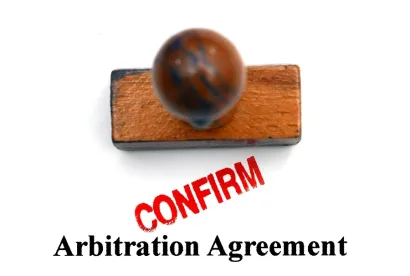An arbitrator tasked with resolving claims brought by a New Jersey school district against a faculty member erred when he impermissibly converted one count of the complaint from unbecoming conduct to one of sexual harassment and found the school district did not present sufficient evidence to support a charge of sexual harassment, the New Jersey Supreme Court has held. Bound Brook Bd. of Educ. v. Ciripompa, A-57-15 (076905), 2017 N.J. LEXIS 227 (Feb. 21, 2017).
The Court invalidated the arbitrator’s decision and remanded the matter for review before a new arbitrator. This is rare, as courts usually show deference to arbitrators’ decisions.
Background
Glenn Ciripompa was employed as a tenured high school math teacher in the Bound Brook School District. During his employment, the Bound Brook Board of Education received copies of student Twitter posts alleging Ciripompa electronically transmitted nude photographs.
The Board investigated the defendant’s alleged inappropriate conduct and found that he pervasively misused his District-issued laptop and iPad by sending and receiving sexually explicit emails and photographs, and that he engaged in inappropriate behavior toward female colleagues in the presence of students.
Based on its investigatory findings, the Board sought to terminate Ciripompa’s tenured employment position with the District on the basis that he engaged in unbecoming conduct in violation of the New Jersey Tenure Employees Hearing Law (“TEHL”), N.J.S.A. §§ 18A:6-10 to -18.1.
TEHL Proceeding
The TEHL provides that tenured public school teachers “shall not be dismissed or reduced in compensation…except for inefficiency, incapacity, unbecoming conduct, or other just cause.” Charges of unbecoming conduct against a teacher are first presented to the Board and, if substantiated, the charges are submitted for review by the Commissioner of Education. If the Commissioner agrees that the charges warrant termination, the matter is then referred to an arbitrator. The TEHL provides that an “[t]he arbitrator’s determination shall be final and binding and…shall be subject to judicial review and enforcement as provided” under N.J.S.A. § 2A:24-7 through N.J.S.A. § 2A:24-10.
The Board initiated the TEHL’s three-step process by filing a two-count complaint against Ciripompa asserting that his conduct warranted dismissal from the District. In Count I of the complaint, labeled “Conduct Unbecoming,” the Board alleged Ciripompa improperly used his District-issued laptop and iPad in violation of the District’s policy. In Count II of the complaint, the Board did not identify a particular cause of action, but alleged, inter alia, that during the 2013-2014 school year, complaints were received about Ciripompa’s inappropriate conduct toward female staff members and that interviews of female staff members revealed that he repeatedly engaged in unprofessional, inappropriate, and potentially harassing behavior toward female staff members. The defendant had asked female staff members out on dates in front of students, commented on female staff members’ attire and appearance, and used students to deliver flowers and inappropriate messages to at least one female staff member.
Following TEHL procedures, the Board determined by a majority vote that the evidence supported the charges asserted against Ciripompa and warranted terminating his tenured employment position. The Commissioner agreed. The charges were submitted for review by an arbitrator.
Arbitrator’s Decision
The arbitrator determined the Board presented sufficient evidence to prove the allegations of “Conduct Unbecoming” in Count I of the complaint. The evidence adduced at the arbitration hearing demonstrated Ciripompa violated the District’s policy when he sent sexually explicit pictures of himself and sought similar pictures from women over the District’s network. Ciripompa’s devices also contained nude pictures and sexually explicit emails, including communications wherein he propositioned others for paid sexual services.
The arbitrator, however, dismissed Count II with prejudice and reduced the penalty from termination to a 120-day suspension without pay. The arbitrator determined the nature of the allegations in the unlabeled Count II most aptly formed the basis of a claim of sexual harassment or hostile work environment. Accordingly, the arbitrator applied the standard in Lehmann v. Toys ‘R’ Us, 132 N.J. 587 (1993), the seminal case governing sexual harassment claims under the New Jersey Law Against Discrimination (“NJLAD”).
To establish a claim for unlawful sexual harassment under the NJLAD, a plaintiff must show the alleged conduct would not have occurred but for one’s gender, and that the alleged conduct was severe or pervasive enough to make a reasonable person believe the conditions of employment are altered and the working environment is hostile or abusive.
Applying this standard, the arbitrator determined the Board failed to establish a cognizable claim of sexual harassment because Ciripompa’s conduct, albeit a shocking abdication of his professional responsibility, was not sufficiently severe or pervasive to modify the female staff members’ conditions of employment in a material way.
The Board sought review of the arbitrator’s determination. The Superior Court, Chancery Division reversed and remanded the matter for review before a new arbitrator. It found the arbitrator erroneously changed the nature of Count II and imposed an inappropriate standard. On appeal, the Appellate Division reversed the Chancery Division’s decision and reinstated Ciripompa’s 120-day suspension. Bound Brook Bd. of Educ. v. Ciripompa, 442 N.J. Super. 515, 518, 526 (App. Div. 2015). It found that although Count II did not use the words “sexual harassment,” it alleged Ciripompa acted inappropriately toward female staff members, and thus, the nature of the allegations showed sexual harassment was the basis for the charge.
The New Jersey Supreme Court agreed to decide the limited issue of whether the arbitrator exceeded his authority when he applied the Lehmann standard and dismissed Count II of the complaint. The Board argued the arbitrator lacked the authority to unilaterally convert Count II into a claim for sexual harassment, which mandated a higher legal standard than that required to prove a claim of unbecoming conduct. Ciripompa argued the arbitrator properly applied the Lehmann standard based on the allegations and proofs adduced by both parties at the arbitration hearing.
Supreme Court’s Decision
The New Jersey Supreme Court held the arbitrator imperfectly executed his power by misinterpreting the intentions of the Board so significantly as to impose a sexual harassment analysis and failing to decide Count II under a standard of unbecoming conduct.
First, the Court determined there were proper grounds to vacate the arbitral award. An arbitrator’s award should be consonant with the factual and legal issues submitted by the parties. Grover v. Universal Underwriters Ins. Co., 80 N.J. 221, 231 (1979). Further, a court may vacate an arbitral award “where the arbitrators exceeded or so imperfectly executed their powers that a mutual, final and definite award upon the subject matter submitted was not made.” The Court then held the arbitrator’s actions implicated subsection (d) of N.J.S.A. § 2A:24-8 because the arbitrator was alleged to have impermissibly transmuted Count II’s allegations of unbecoming conduct into a claim of sexual harassment and decided a legal issue not placed before him by the parties. The Court cited with approval Metromedia Energy, Inc. v. Enserch Energy Servs., in which the federal appeals court stated, “[w]hen confronted with an allegation that the arbitrators exceeded their authority by resolving an issue the parties did not intend to submit, we will review the arbitrator’s interpretation of the parties’ intentions under a ‘highly deferential’ standard. Nonetheless, this deference is not a rubber stamp.” 409 F.3d 574, 579 (3d Cir. 2005), cert. denied, 546 U.S. 1089 (2006).
Next, the Court defined the appropriate legal standard for a claim of unbecoming conduct. Under New Jersey law, unbecoming conduct is defined as conduct “which has a tendency to destroy public respect for [government] employees and confidence in the operation of [public] services” and “may include ‘any conduct which adversely affects the morale or efficiency of the [department].’” The Court noted that while there may be instances in which the underlying factual circumstances form both causes of action, a claim of unbecoming conduct is governed by a separate, distinct legal standard, which requires only evidence of inappropriate conduct by teaching professionals.
Finally, the Court held the Lehmann standard is not applicable to a termination hearing under the TEHL. The Court found the Board’s overarching justification for Ciripompa’s termination was based on his inappropriate conduct in the presence of the students, and not the result of his potentially harassing behavior toward female staff members. The Court distinguished this case from the typical sexual harassment case, where an employee individually asserts a claim against the employer for failing to correct or remediate sexual harassment in the workplace. Thus, it held that “[t]he instant matter is not an employee-versus-employer dispute that requires application of the Lehmann standard.” Accordingly, the Court invalidated the arbitrator’s decision and remanded the matter for review before a new arbitrator.




 />i
/>i
